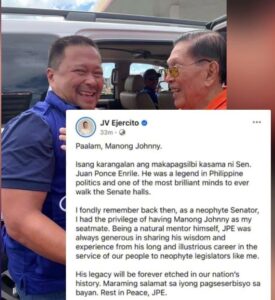The Final Chapter: Senator Juan Ponce Enrile Dies at Home

Former Senate President and long-serving statesman, Juan Ponce Enrile, passed away on November 13th at the remarkable age of 101. The news was made public by his daughter, Katrina Ponce Enrile, who confirmed that the former Senator died peacefully at his residence, surrounded by his immediate family—a final request the family was honored to fulfill. The official time of death was recorded at approximately 4:21 PM.
In an official statement, the family revealed that Enrile had been receiving treatment for pneumonia in the days leading up to his passing, with his condition necessitating a recent stay in the Intensive Care Unit (ICU), as previously shared by his daughter and confirmed by Senator Jinggoy Estrada.
The family’s heartfelt statement requested privacy during this time of grief: “It was his heartfelt wish to take his final rest at home with his family by his side. We were blessed to honor the wish and to be with him in those sacred final moments. He dedicated much of his life to the service of the Filipino people. At this time, we humbly ask for the public’s understanding as our family takes a brief moment to grieve privately and honor his memory together in quiet and in peace.”
Political Tributes: Honoring Manong Johnny’s Mark
The passing of Juan Ponce Enrile, often referred to respectfully as “Manong Johnny,” prompted immediate and extensive tributes from across the Philippine political spectrum, acknowledging his undeniable impact on the nation’s history.
President Bongbong Marcos led the commendations, reflecting on the Senator’s long tenure: “For over 50 years, Juan Ponce Enrile dedicated his life to serving the Filipino people, helping guide the country through some of its most challenging and defining moments. Even in his final years, he remained brilliant, sharp, and firm in his belief that law and governance must always serve the Filipino people.” The President concluded by stating that Enrile’s passing “marks the close of a chapter in our nation’s history, but the mark he leaves behind in law, in governance, and in the hearts of those he served will never be forgotten.”
In the Senate session, Senate President Tito Sotto paid tribute to Enrile’s service, particularly his term as the 21st Senate President from 2008 to 2013. Sotto highlighted his “formidable intellect and passion for the people, especially for the employees of the Senate,” adding that his legacy “will always live on… within the walls of this institution that he loved.”
Other senators also shared personal reflections:
Senator JV Ejercito recalled Enrile as a “natural mentor,” grateful for the wisdom and experience he shared with “neo-fight legislators” like himself.
Senator Jinggoy Estrada expressed that he would never forget their fellowship inside and outside the Senate, bidding farewell with the words: “Manong Johnny, you will be etched in my being forever.”
Senator Imee Marcos offered a simple tribute in the Ilocano language: “Diyos kumuyog,” meaning “God be with you.”
Senator Sonny Angara focused on Enrile’s “brilliant” legislative mind and reminisced about a shared dream with Angara’s late father: the construction of a Pacific Coastal Highway linking regions in Northern and Eastern Luzon.
Celebrity Reactions: Sympathy and Scrutiny
The response from celebrities was more nuanced and reflective of the complex public sentiment surrounding Enrile.
Actress Rufa Gutierrez offered her sincere condolences on the family’s official post, noting a personal connection: “My deepest condolences Moma [Mrs. Enrile]. I will miss all the stories he shared with us.”
More controversially, actor Enrique Gil, who once portrayed the Senator in a Maalaala Mo Kaya episode, posted a reaction that garnered significant attention before being deleted. Gil expressed his condolences but also criticized those who were celebrating Enrile’s death: “Rest in peace Sen. Let us not stress ourselves. Those who celebrate your loss will also be held accountable.” This post highlighted the deeply polarized public reaction to the news.
A Legacy of Health Challenges and Political Controversy
Juan Ponce Enrile’s later years were marked by persistent health issues. Since 2013, he had been repeatedly hospitalized for conditions including hypertension, diabetes, dyslipidemia, and coronary artery calcification. His frail health played a significant role in his legal battles, particularly during his indictment in 2014 for plunder related to the controversial “pork barrel” scam. During this time, the courts allowed him to remain under hospital arrest due to his deteriorating health, confirming his status as a medically vulnerable detainee. His health challenges included a severe bout with pneumonia in 2015 and a mild case of COVID-19 pneumonia in 2022.
Enrile’s public service career, spanning nearly seven decades, from 1924 to 2025, made him one of the longest-serving and most controversial figures in Philippine politics. His political journey is inextricably linked to the most turbulent periods of the nation’s history. He served as both Secretary of Justice and later Defense Minister under Ferdinand Marcos Sr., making him a key figure—and, according to critics, a chief architect—in the implementation of Martial Law in 1972. His pivotal role in the military and state security during the dictatorship remains the source of intense public criticism and historical debate.
Conclusion: A Life of Dichotomy
The reaction to Juan Ponce Enrile’s death is deeply divided, mirroring his own complex and divisive role in Philippine history. While his family and political colleagues mourn the loss of a brilliant mind and a dedicated public servant who guided the nation through crucial moments, a segment of the public expresses criticism, unable to reconcile his contributions with his involvement during the Martial Law era.
The family has expressed gratitude for the condolences received, focusing on the memory of his dedication to service. As the nation processes the passing of “Manong Johnny,” it is left to grapple with a legacy that is permanently etched into the legal, political, and emotional tapestry of the Philippines—a life marked by both monumental public service and profound political controversy.





